
New York, NY – April 1, 2024 – In a challenge brought by AT&T Services, Inc., BBB National Programs’ National Advertising Division determined that Cox Communications Inc. provided a reasonable basis for the claim that Cox Mobile provides “Unbeatable 5G Reliability” as well as other express claims about its host network and implied claims about third-party testing of Cox Mobile.
The challenged “Unbeatable 5G Reliability” claims appeared in a 30-second television commercial and on the Cox Mobile website with a disclosure noting that “Cox Mobile runs on the network with unbeatable 5G reliability as measured by Ookla, LLC in the U.S., 1H 2023.”
In support of its “Unbeatable 5G Reliability” claims, Cox relied on RootMetrics’ Nationwide 5G testing, which assessed the performance of the three major carriers, AT&T, T-Mobile, and Verizon. Cox further relied on the additional testing conducted by RootMetrics in October 2023, which tested devices used by Cox Mobile customers. Cox also provided head-to-head 5G reliability testing of the MVNO, Cox Mobile, and its host network, Verizon.
After reviewing the evidence, the National Advertising Division (NAD) determined that Cox Mobile established a reasonable basis to support the claims:
- “Cox Mobile runs on the network with unbeatable 5G reliability”
- “We run on the network with unbeatable 5G reliability”
- “Cox Mobile runs on the network with unbeatable 5G reliability as measured by Ookla, LLC in the U.S.”
NAD further determined that the implied claim that Ookla, LLC has conducted testing of 5G reliability for Cox Mobile customers was supported.
In its advertiser statement, Cox stated that it “appreciates NAD’s recognition that its unbeatable 5G reliability claim is fully supported.”
All BBB National Programs case decision summaries can be found in the case decision library. For the full text of NAD, NARB, and CARU decisions, subscribe to the online archive. This press release shall not be used for advertising or promotional purposes.
About BBB National Programs: BBB National Programs, a non-profit organization, is the home of U.S. independent industry self-regulation, currently operating more than a dozen globally recognized programs that have been helping enhance consumer trust in business for more than 50 years. These programs provide third-party accountability and dispute resolution services that address existing and emerging industry issues, create a fairer playing field for businesses, and a better experience for consumers. BBB National Programs continues to evolve its work and grow its impact by providing business guidance and fostering best practices in arenas such as advertising, child-and-teen-directed marketing, data privacy, dispute resolution, automobile warranty, technology, and emerging areas. To learn more, visit bbbprograms.org.
About the National Advertising Division: The National Advertising Division of BBB National Programs provides independent self-regulation and dispute resolution services, guiding the truthfulness of advertising across the U.S. The National Advertising Division reviews national advertising in all media and its decisions set consistent standards for advertising truth and accuracy, delivering meaningful protection to consumers and leveling the playing field for business.
Contact Information
Name: Jennie Rosenberg
Email: jrosenberg@bbbnp.org
Job Title: Media Relations
The Wireless Charging Innovators Poised to Capture the $1B+ Royalty Market

In a new report, “Who is Leading the Qi Standard Patent Race” LexisNexis reveals the most promising innovators in the growing wireless charging market
NEW YORK, March 27, 2024 – Wireless charging, using Qi standard technology, is moving well beyond cell phones into industries as diverse as automotive, healthcare, and hospitality. With over 9,000 Qi-compliant products on the market and 1 billion sold in 2023, Qi has become a crucial technology for enabling wireless power transfer between devices without cables or connectors.
LexisNexis® Legal & Professional, a leading global provider of information and analytics, today released a new report, “Who Leads the Qi Wireless Charging Patent Race?” that analyzes the patent landscape around the Qi wireless charging standard.
The widespread adoption of Qi makes it a lucrative market for owners of standard essential patents (SEPs), which any implementer of the Qi standard must license.
In January 2020, Via Licensing Alliance, a patent pool administrator, announced a license for patents essential to the Qi standard, providing a comprehensive access point for wireless charging and power transfer. Since then, Via LA has attracted many of the largest Qi SEP owners and has published a list of more than 470 Qi standard essential patent documents on its website. Under the patent pool license contract, these SEP owners commit to license all SEPs for an aggregated pool rate between $0.20 to $0.85 per Qi standard-compliant product (receivers and transmitters).
Since not all holders of Qi-relevant patents are patent pool members, the total royalty market is estimated to be roughly one billion dollars.
The report reveals that only around 26-36% of all Qi-related patents are publicly disclosed to be standard essential through the Via Licensing Alliance Qi standard patent pool.
Exploring the Qi-related patent landscape using LexisNexis® IPlytics™ and the LexisNexis® PatentSight+™ patent analytics platform, including machine learning-based LexisNexis® Classification, the LexisNexis® Intellectual Property Solutions experts identified more than 3,500 worldwide active and granted patent families relevant to Qi as of January 2024. Applying the LexisNexis Ultimate Owner concept, which assigns every patent to its highest controlling legal entity, to this broader set, Samsung, Apple, Canon, LG Electronics, Panasonic, Philips, LG Innotek, and Qualcomm lead in terms of the number of patent families related to Qi wireless charging. The study also considered the quality of these patent portfolios leveraging the Patent Asset Index metric, also featured in PatentSight+™.
Top patent owners ranked by the quantity of Qi-related patent families
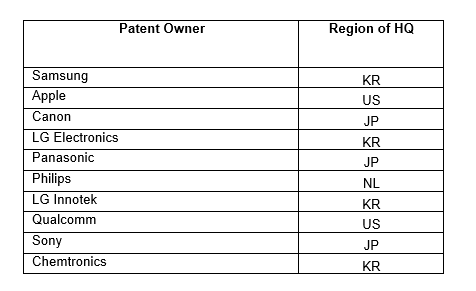
As Qi adoption rapidly grows, patent holders are poised to accelerate their monetization efforts through licensing deals. Manufacturers implementing Qi must prepare for negotiations by benchmarking patent holders’ relative strength.
“With the release of Qi 2.0 November last year, we now anticipate the usage of wireless charging expanding significantly,” said Tim Pohlmann, CEO and founder of LexisNexis® IPlytics™. “With so much at stake, licensors and licensees must not forego a detailed understanding of the Qi patent landscape through analytics to negotiate royalties effectively.”
The full report provides further details on the Qi patent landscape, the top 30 leading owners ranked by quantity and strength of their Qi-related portfolio, future considerations, and insights into unlocking value in the Qi marketplace. It is available for download at: https://www.lexisnexisip.com/Qi-Patents
About LexisNexis® Legal & Professional
LexisNexis® Legal & Professional provides legal, regulatory, and business information and analytics that help customers increase their productivity, improve decision-making, achieve better outcomes, and advance the rule of law around the world. As a digital pioneer, the company was the first to bring legal and business information online with its Lexis®and Nexis® services. LexisNexis Legal & Professional, which serves customers in more than 150 countries with 11,800 employees worldwide, is part of RELX, a global provider of information-based analytics and decision tools for professional and business customers.
About LexisNexis® Intellectual Property Solutions
LexisNexis® Intellectual Property Solutions bring clarity to innovation for businesses worldwide. We enable innovators to accomplish more by helping them make informed decisions, be more productive, comply with regulations, and ultimately achieve competitive advantage for their business. Our broad suite of workflow and analytics solutions (LexisNexis® PatentSight+™, LexisNexis® Cipher™, LexisNexis® IPlytics™, LexisNexis PatentOptimizer®, LexisNexis PatentAdvisor®, and LexisNexis TotalPatent One®, LexisNexis® IP DataDirect), enables companies to be more efficient and effective at bringing meaningful innovations to our world. We are proud to directly support and serve these innovators in their endeavors to better humankind.
Media Contact:
Holger Zimmer
Global Director Strategic Communications and Partnerships
Holger.Zimmer@LexisNexis.com
+49 151 176 636 75
National Advertising Division Recommends Naked & Thriving Discontinue Certain Claims; Advertiser Voluntarily Modifies Bare Beauty Babes Website

New York, NY – March 26, 2024 – BBB National Programs’ National Advertising Division, as part of its routine monitoring program, recommended that Naked & Thriving Inc. discontinue certain claims in the Bare Beauty Babes blog and on social media.
The Bare Beauty Babes blog and an Instagram post contained an article authored by dermatologist Dr. Gabriela Vee – “Does Hyaluronic Acid Help to Fight Signs of Aging? I’ve Tested Hundreds of Hyaluronic Acid Serums – Here are 5 That Actually Work” – with the claim “Peter Thomas Roth Drench Hyaluronic Cloud Serum – This product has a very high amount of hyaluronic acid [75%] in addition to silk proteins, zinc, copper, manganese, iron, and silicon to increase moisture levels and soften skin.”
The Bare Beauty Babes blog is owned and sponsored by Naked & Thriving, a family-owned skincare company. Naked & Thriving works with an agency that runs the Bare Beauty Babes blog.
The National Advertising Division (NAD) recommended that Naked & Thriving discontinue the challenged expert endorsements and that it ensure that expert endorsers have the required expertise and have evaluated the products based on their expertise.
In so finding, NAD noted that:
- There was no evidence in the record related to the qualifications or expertise of the endorser, Dr. Vee;
- The record was silent as to the criteria used to rate or rank the products in the category and whether the endorser reviewed and ranked all products in the category (the posts claim that “dozens” or “hundreds” of products were tested); and
- The advertiser did not provide support that Dr. Vee exercised the expertise of a dermatologist in evaluating the products.
NAD further recommended that Naked & Thriving’s endorsers disclose their connection to the Naked & Thriving brand when that connection is not reasonably communicated by the context of the post.
During the inquiry, Naked & Thriving voluntarily modified the Bare Beauty Babes website to include the connection to Naked & Thriving by adding a disclosure on the top of the website. Also, the website no longer promotes or recommends products, but covers healthy living, beauty, and self-care topics. NAD appreciated the changes and will treat those modifications, for compliance purposes, as though NAD recommended the modifications and the advertiser agreed to comply.
In its advertiser statement, Naked & Thriving stated that it “agrees to comply with NAD’s recommendations” although it “disagrees with certain aspects of NAD’s decision.”
All BBB National Programs case decision summaries can be found in the case decision library. For the full text of NAD, NARB, and CARU decisions, subscribe to the online archive. This press release shall not be used for advertising or promotional purposes.
About BBB National Programs: BBB National Programs, a non-profit organization, is the home of U.S. independent industry self-regulation, currently operating more than a dozen globally recognized programs that have been helping enhance consumer trust in business for more than 50 years. These programs provide third-party accountability and dispute resolution services that address existing and emerging industry issues, create a fairer playing field for businesses, and a better experience for consumers. BBB National Programs continues to evolve its work and grow its impact by providing business guidance and fostering best practices in arenas such as advertising, child-and-teen-directed marketing, data privacy, dispute resolution, automobile warranty, technology, and emerging areas. To learn more, visit bbbprograms.org.
About the National Advertising Division: BBB National Programs’ National Advertising Division provides independent self-regulation and dispute resolution services, guiding the truthfulness of advertising across the U.S. The National Advertising Division reviews national advertising in all media and its decisions set consistent standards for advertising truth and accuracy, delivering meaningful protection to consumers and leveling the playing field for business.
Contact:
Jennie Rosenberg
Media Relations
BBB National Programs
press@bbbnp.org
Michelin Surpasses 100 J.D. Power Awards With 2024 Rankings, More Than All Other Tire Manufacturers Combined

- Michelin is the first tire company to earn more than 100 J.D. Power awards.
- For the 21st consecutive year, Michelin is recognized for top customer satisfaction in luxury car segment.
- Michelin is also No. 1 in tire customer satisfaction for passenger car and performance sport vehicle owners.
- Michelin brands, which include BFGoodrich Tires1, have received 104 top-tire rankings.
GREENVILLE, S.C., March 25, 2024 – Michelin, the most awarded tire brand in the U.S, earned its 100th, 101st and 102nd J.D. Power Awards in the J.D. Power 2024 U.S. Original Equipment Tire Customer Satisfaction Study. For 2024, drivers gave Michelin the highest ratings in Original Equipment Tire Customer Satisfaction for Luxury, Passenger Car and Performance Sport Vehicles.
“It is a monumental honor to win awards that are based on consumer feedback, and Michelin could not be prouder to receive more than 100 J.D. Power Awards in customer satisfaction in the tire category,” said Alexis Garcin, President and CEO of Michelin North America, Inc. “As the most awarded tire brand in the U.S., we continue to thank our people who help design, build, and distribute our tires. Our commitment is to provide the best experience for those who chose Michelin tires, and it is humbling to see our mission come to life, year after year.”
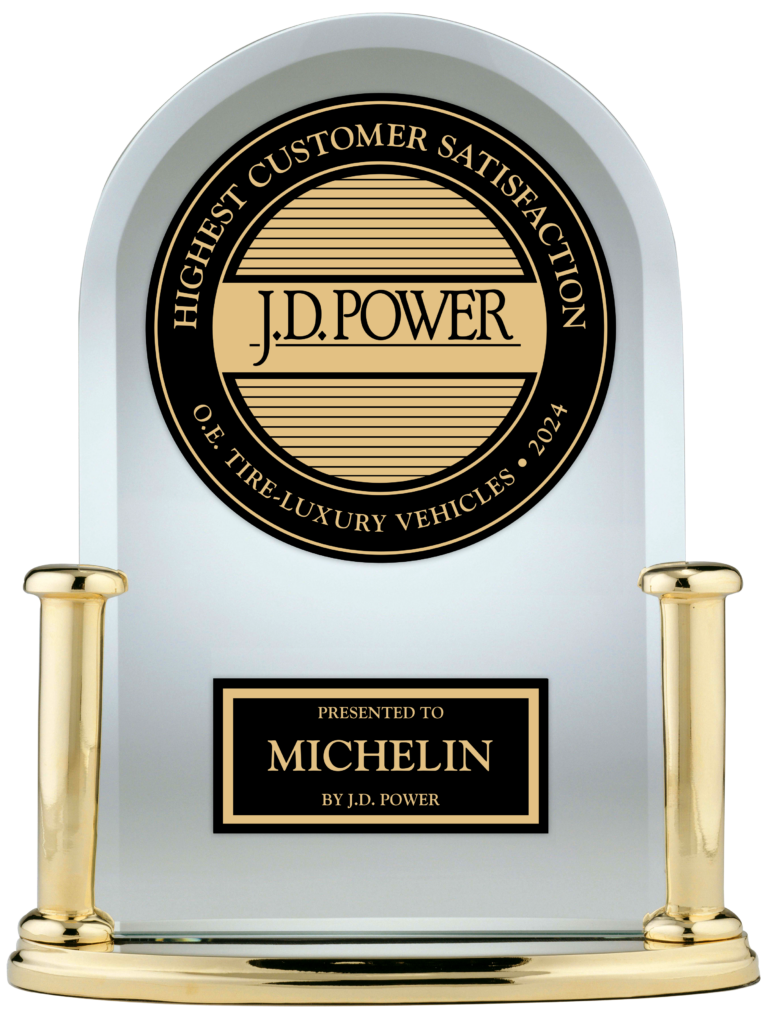
With these honors, Michelin has won 102 total J.D. Power Awards — more than any other tire manufacturer combined. It is the company’s 21st consecutive top ranking in the Luxury segment.
The J.D. Power 2024 U.S. Original Equipment Tire Customer Satisfaction Study was based on responses from more than 31,000 vehicle owners. Satisfaction was examined in four areas: tire wear, tire ride, tire appearance and tire traction/handling.
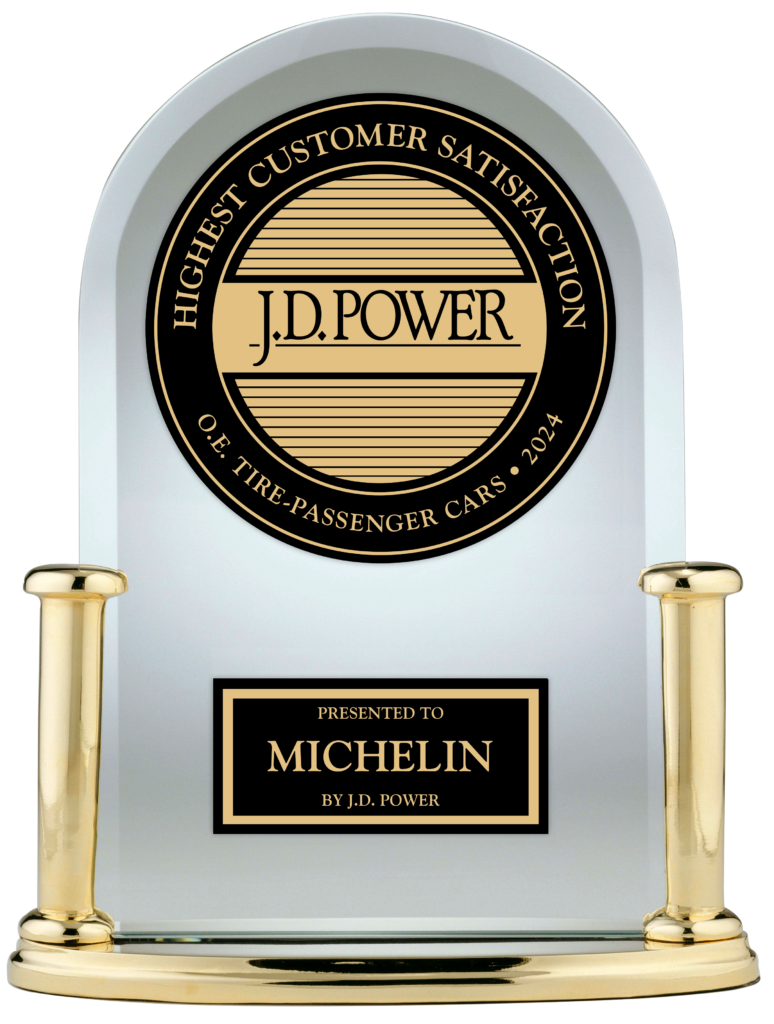
J.D. Power is a global leader in automotive data and analytics, and provides industry intelligence, consumer insights and advisory solutions to the automotive industry and selected non-automotive industries. J.D. Power leverages its extensive proprietary datasets and software capabilities combined with advanced analytics and artificial intelligence tools to help its clients optimize business performance.
J.D. Power was founded in 1968 and has offices in North America, Europe and Asia Pacific. To learn more about the company’s business offerings, visit JDPower.com/business. The J.D. Power auto-shopping tool can be found at JDPower.com.
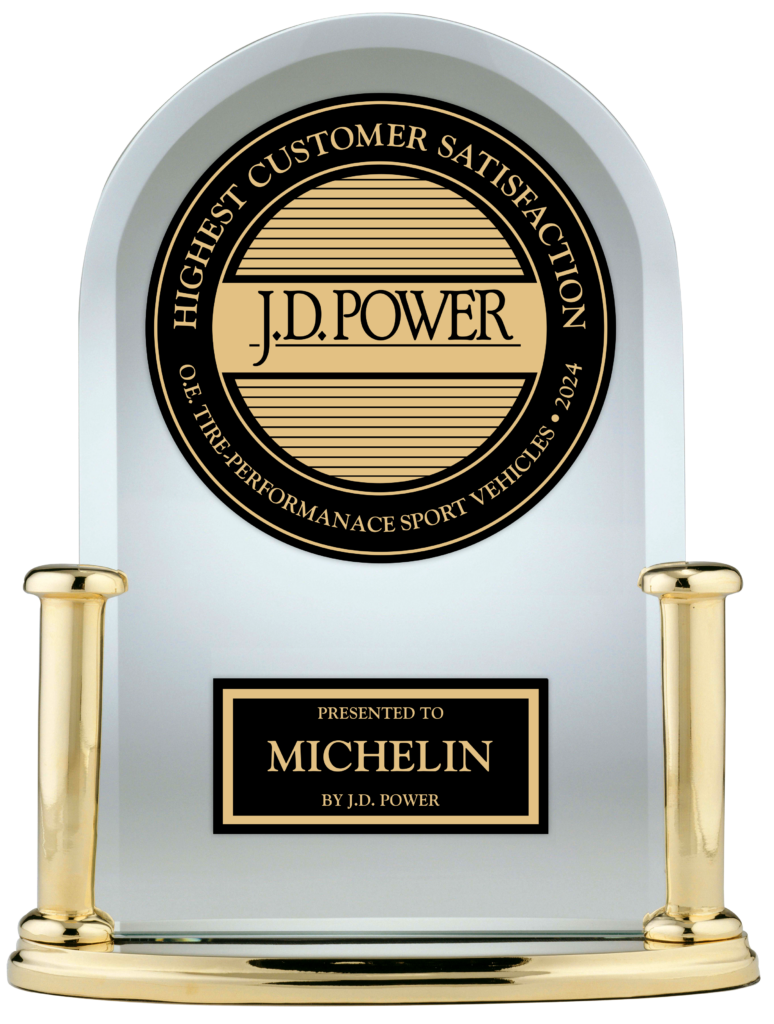
1BFGoodrich received the highest score among light truck vehicles in the J.D. Power 1999 U.S. Original Equipment Tire Customer Satisfaction Study and truck/utility vehicles in the J.D. Power 2022 U.S. Original Equipment Tire Customer Satisfaction Study of customers’ satisfaction with their original equipment tires. Visit jdpower.com/awards for more details.
About Michelin North America, Inc.
Michelin, the leading mobility company, is working with tires, around tires and beyond tires to enable Motion for Life. Dedicated to enhancing its clients’ mobility and sustainability, Michelin designs and distributes the most suitable tires, services and solutions for its customers’ needs. Michelin provides digital services, maps and guides to help enrich trips and travels and make them unique experiences. Bringing its expertise to new markets, the company is investing in high-technology materials, 3D printing and hydrogen, to serve a wide variety of industries — from aerospace to biotech. Headquartered in Greenville, South Carolina, Michelin North America has approximately 23,500 employees and operates 34 production facilities in the United States and Canada. (michelinman.com)
Contact Information
Name: Christian Fisher
Email: christian.fisher@michelin.com
Job Title: Press Officer
National Advertising Division Refers Claims for Spectrum Home Internet Service to Regulatory Authorities for Further Review

New York, NY – March 21, 2024 – BBB National Programs’ National Advertising Division has referred advertising claims made by Charter Communications Inc. for its Spectrum home internet service to the Federal Trade Commission (FTC) and other regulatory authorities for review after Charter declined to participate in the industry self-regulation process.
The claims at issue were challenged by T-Mobile US, Inc. in two separate National Advertising Division (NAD) challenges. Both challenges outlined below alleged that advertising for Charter’s Spectrum home internet service falsely denigrated T-Mobile’s competing 5G Home Internet Service (T-HINT).
- In a Fast-Track SWIFT challenge, an expedited process designed for single-issue advertising cases, T-Mobile alleged that Charter’s claim that T-HINT is “Cell Phone Internet” is expressly false because T-HINT is not the same as internet service on current cellular phones and because T-HINT is a dedicated home internet service. Charter argued that the challenge should not proceed in Fast-Track SWIFT and that it should be consolidated with another pending challenge. NAD determined that the challenge could proceed.
- In another challenge, T-Mobile argued that Charter’s “Walls” commercial, which aired during the broadcast of Super Bowl LVIII in February 2024, included the unsupported implied claim that T-HINT is too slow to use because it is “blocked” by a home’s walls. T-Mobile argued that this claim greatly overstates T-HINT’s actual limitations.
The challenged claims appeared on the Spectrum website, in a television commercial, on YouTube, and on social media.
Considering Charter’s decision not to participate in the NAD self-regulatory process with respect to these claims, NAD has referred the matter to the FTC and other regulatory authorities for review and possible enforcement action. NAD will also ask social media platforms to review the challenged advertising to determine if it is consistent with platform advertising standards or policies.
All BBB National Programs case decision summaries can be found in the case decision library. For the full text of NAD, NARB, and CARU decisions, subscribe to the online archive. This press release shall not be used for advertising or promotional purposes.
About BBB National Programs: BBB National Programs, a non-profit organization, is the home of U.S. independent industry self-regulation, currently operating more than a dozen globally recognized programs that have been helping enhance consumer trust in business for more than 50 years. These programs provide third-party accountability and dispute resolution services that address existing and emerging industry issues, create a fairer playing field for businesses, and a better experience for consumers. BBB National Programs continues to evolve its work and grow its impact by providing business guidance and fostering best practices in arenas such as advertising, child-and-teen-directed marketing, data privacy, dispute resolution, automobile warranty, technology, and emerging areas. To learn more, visit bbbprograms.org.
About the National Advertising Division: BBB National Programs’ National Advertising Division provides independent self-regulation and dispute resolution services, guiding the truthfulness of advertising across the U.S. The National Advertising Division reviews national advertising in all media and its decisions set consistent standards for advertising truth and accuracy, delivering meaningful protection to consumers and leveling the playing field for business.
Contact Information:
Name: Jennie Rosenberg
Email: jrosenberg@bbbnp.org
Job Title: Media Relations
Following National Advertising Division Challenge, NourishMax Voluntarily Discontinues Certain Claims for its Diamond Infused Eye Cream
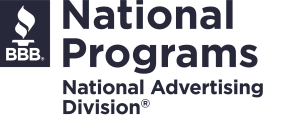
New York, NY – March 21, 2024 – Following a challenge brought by BBB National Programs’ National Advertising Division as part of its routine monitoring program, NourishMax discontinued certain advertising claims used to promote its NourishMax Diamond Infused Eye Cream.
The National Advertising Division (NAD) challenged the claims:
- “After researching and testing hundreds of eye cream products, we kept coming back to NourishMax Diamond Infused Eye Cream. This top pick features a comprehensive list of hard-hitting ingredients that target every eye concern, from dark circles, fine lines, wrinkles, and puffiness to telltale signs of aging like crow’s feet.”
- Overall Rating (4.9)
- Quality Rating: 10/10
- Expert Rating: 9.9/10
- Users Rating: 9.8/10
NAD also challenged the implied claim that the Skincarebrandsreviews webpage featuring these claims reflects independent, honest opinions of the reviewers.
NourishMax informed NAD that it permanently discontinued the challenged claims and that the Skincarebrandsreviews webpage would be taken down. Therefore, NAD did not review the claims on their merits and will treat the claims, for compliance purposes, as though NAD recommended they be discontinued.
NAD appreciated NourishMax’s action given concerns about review websites that appear to be independent but are, in fact, controlled by advertisers and thereby constitute advertising.
NourishMax declined to provide an advertiser’s statement given the case disposition.
All BBB National Programs case decision summaries can be found in the case decision library. For the full text of NAD, NARB, and CARU decisions, subscribe to the online archive. This press release shall not be used for advertising or promotional purposes.
About BBB National Programs: BBB National Programs, a non-profit organization, is the home of U.S. independent industry self-regulation, currently operating more than a dozen globally recognized programs that have been helping enhance consumer trust in business for more than 50 years. These programs provide third-party accountability and dispute resolution services that address existing and emerging industry issues, create a fairer playing field for businesses, and a better experience for consumers. BBB National Programs continues to evolve its work and grow its impact by providing business guidance and fostering best practices in arenas such as advertising, child-and-teen-directed marketing, data privacy, dispute resolution, automobile warranty, technology, and emerging areas. To learn more, visit bbbprograms.org.
About the National Advertising Division: BBB National Programs’ National Advertising Division (NAD) of BBB National Programs provides independent self-regulation and dispute resolution services, guiding the truthfulness of advertising across the U.S. The National Advertising Division reviews national advertising in all media and its decisions set consistent standards for advertising truth and accuracy, delivering meaningful protection to consumers and leveling the playing field for business.
Contact:
Jennie Rosenberg
Media Relations
BBB National Programs
press@bbbnp.org
Partners Provides Therapy Dog to Lincoln County’s Asbury Academy
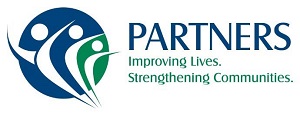
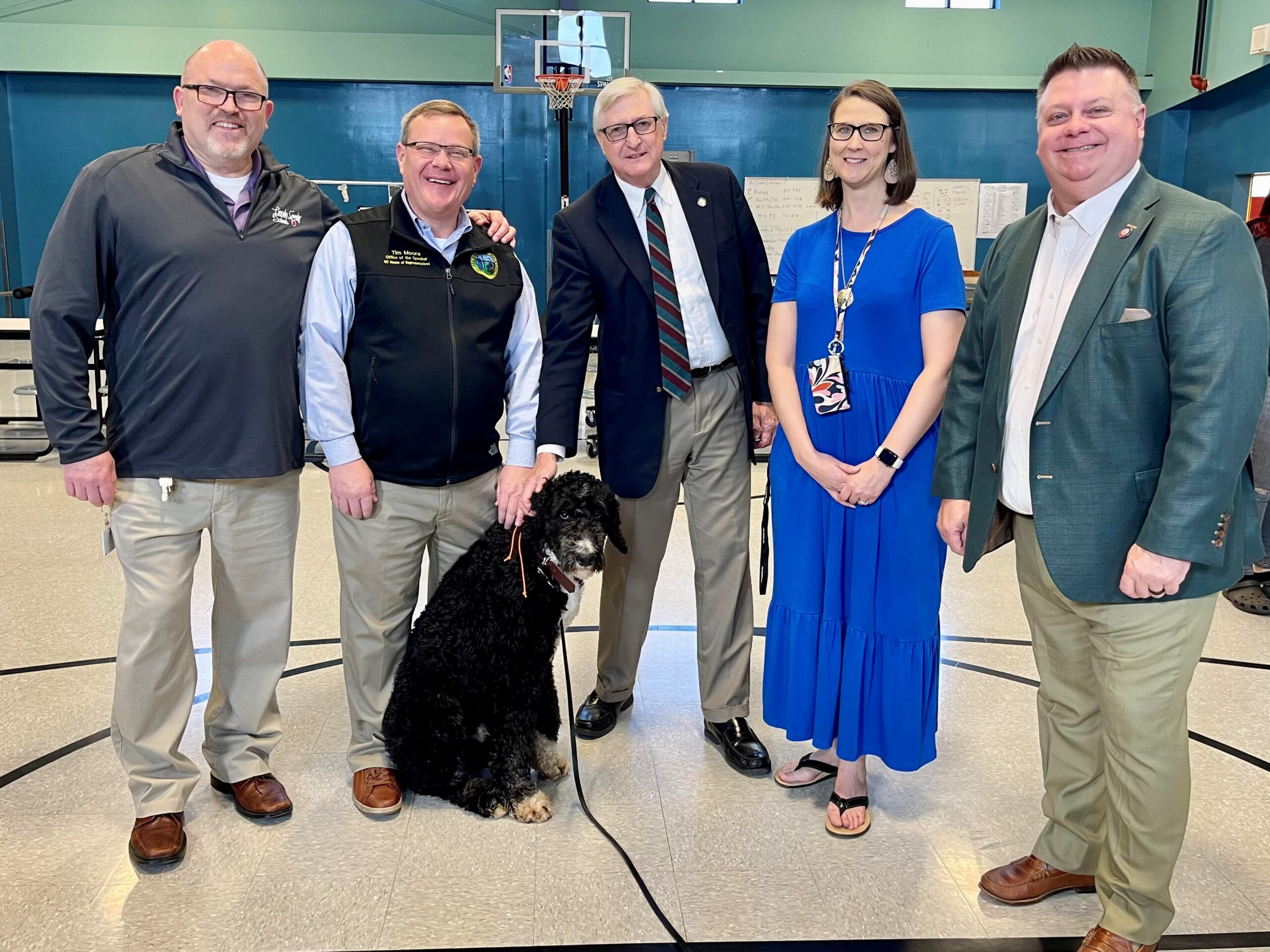
LINCOLNTON, N.C., MARCH 20, 2024 – Partners Health Management joined Asbury Academy, Lincoln County Schools and local legislators Wednesday morning in welcoming Bernie (the therapy dog) to the school to provide ongoing healing, comfort and support to students alongside human guidance counselors.
Partners was able to provide Bernie to Asbury Academy using funding from the federal Child Mental Health Block Grant. An 18-month-old Bernedoodle, Bernie was specially trained to provide support to students.
“I am encouraged that Partners is employing community service block grant funds to address the ongoing mental health concerns in our area, particularly with our children,” said N.C. House Speaker Tim Moore. “This investment will play a crucial role in our community, using creative tools to meet pressing mental health needs.”
Asbury Academy Principal Mark Grega said studies have shown that there are benefits to having a therapy dog in schools for all students but especially for special needs students. “These dogs are great listeners that don’t make any judgments, help students feel connected and build confidence, reduce anxiety, and help to quickly de-escalate students during emotionally challenging times,” Grega said.
Students also can receive cognitive benefits from reading to Bernie and learn responsibility by helping to bathe, brush, feed and take Bernie out for potty breaks during school, Grega said.
“Overall, it’s a tremendous benefit to have such a dog in our alternative school setting and we anticipate students will have more opportunities to practice their social skills, their communication skills and see improvement in anxiety, depression and other mental health issues,” Grega said.
Holly Wall, Partners Regional Director of Community Operations, said Partners is happy to be able to provide a therapy dog to the school. “Bernie has the chance to make a real difference for the kids at Asbury Academy and that is why we wanted to make this happen. Our hope is that Bernie will have a lasting, positive impact on student mental health.”
N.C. State Senator W. Ted Alexander and N.C. State Rep. Jason Saine, both of whom represent Lincoln County, met Bernie and talked with students and staff at Asbury Academy Wednesday.
“We know intuitively that dogs bring a lot of peace to us. It is great the schools can integrate service animals into what they do to bring some much-needed tranquility to students,” Rep. Saine said. “Bernie will be wonderful addition to the team in service of the kids at Asbury.”
Senator Alexander agreed. “Supporting our young people is important for the health and future of our communities. Bernie seems like he is up to the task, and I am so glad he’s here to support these students.”
The Lincolnton community is helping with Bernie’s care. When he is not working, Bernie will stay with Asbury Academy Guidance Counselor Alyson Spencer and her family. The Grooming Lady of Lincolnton has offered free grooming services to keep Bernie looking sharp for school. DocTerra Mobile Veterinary Services of Lincolnton will provide free veterinary services.
Andy Hanellin of Dogs by Andy Kennel & Training Center in Mooresville, N.C., trained Bernie for his new job.
To learn more about Partners, visit our website at www.partnersbhm.org

ABOUT PARTNERS
Partners Health Management is a leading local managed care organization (LME/MCO), providing access to care for central and western North Carolina’s most vulnerable citizens. Partners manages all Medicaid, state and local funding for intellectual/developmental disabilities, mental health and substance use disorder (IDD/MH/SUD) services in our covered areas.
We are recognized across North Carolina for our Partners Community Model and unwavering commitment to the counties and the families we serve. Through our steadfast community focus and longstanding partnerships with local stakeholders, agencies and elected officials, our members receive the care and support they need.
Contact Information
Name: Karen Cimino
Email: kcimino@partnersbhm.org
Job Title: Digital Media Specialist
Following National Advertising Division Challenge, Mobile Fox Voluntarily Discontinues Certain Claims for Solitaire Arena Game
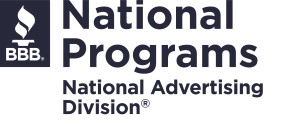
New York, NY – March 19, 2024 – Following a challenge brought by the BBB National Programs National Advertising Division as part of its routine monitoring program, Mobile Fox Limited discontinued certain advertising claims promoting its Solitaire Arena mobile app game.
The National Advertising Division (NAD) challenged the claims:
- “Play for 1 hour – You get $200”;
- “You can use it to pay your own rents” [sic]; and
- The implied claim that Solitaire Arena players will typically earn large amounts of money in a short period of time.
Mobile Fox informed NAD that it permanently discontinued the challenged claims. Therefore, NAD did not review the claims on their merits and will treat the claims, for compliance purposes, as though NAD recommended they be discontinued.
In its advertiser statement, Mobile Fox stated that it appreciates “the NAD’s thorough review and opportunities to modify our advertising to ensure it aligns with regulations and best practices” and that “[c]ompliance with established guidelines will be a top priority as we continue bringing our products and services to market responsibly.”
All BBB National Programs case decision summaries can be found in the case decision library. For the full text of NAD, NARB, and CARU decisions, subscribe to the online archive. This press release shall not be used for advertising or promotional purposes.
About BBB National Programs: BBB National Programs, a non-profit organization, is the home of U.S. independent industry self-regulation, currently operating more than a dozen globally recognized programs that have been helping enhance consumer trust in business for more than 50 years. These programs provide third-party accountability and dispute resolution services that address existing and emerging industry issues, create a fairer playing field for businesses, and a better experience for consumers. BBB National Programs continues to evolve its work and grow its impact by providing business guidance and fostering best practices in arenas such as advertising, child-and-teen-directed marketing, data privacy, dispute resolution, automobile warranty, technology, and emerging areas. To learn more, visit bbbprograms.org.
About the National Advertising Division: BBB National Programs’ National Advertising Division provides independent self-regulation and dispute resolution services, guiding the truthfulness of advertising across the U.S. The National Advertising Division reviews national advertising in all media and its decisions set consistent standards for advertising truth and accuracy, delivering meaningful protection to consumers and leveling the playing field for business.
Contact:
Jennie Rosenberg
Media Relations
BBB National Programs
press@bbbnp.org
Following National Advertising Division Challenge, Ginger Health Voluntarily Modifies or Discontinues Certain Wonderbelly Antacids Claims

New York, NY – March 14, 2024 – Following a BBB National Programs’ National Advertising Division challenge brought by Haleon, plc, Ginger Health Company (Wonderbelly) voluntarily modified certain claims for its Wonderbelly Antacids, including:
- Modification of its influencer practices to add #ad #WonderbellyPartner to the beginning of each influencer post;
- Requiring its influencers to include a verbal notice of their partnership with Wonderbelly in any video influencer material; and
- Modification of its advertising (particularly in connection with the retelling of its origin story) to avoid conveying the message that either TUMS or talc causes cancer or are otherwise harmful.
Wonderbelly also informed the National Advertising Division (NAD) that it voluntarily agreed to discontinue certain other challenged claims and, therefore, NAD did not review these claims on their merits. NAD will treat the modified and discontinued claims, for compliance purposes, as though NAD recommended they be modified or discontinued.
Further, Haleon challenged a social media post by Demi Moore in which she stated that her promotion of Wonderbelly was “not an ad” and failed to disclose that she is an investor in the brand. In addition to other modifications Wonderbelly is making, NAD recommended that Wonderbelly discontinue the “not an ad” language.
NAD also recommended that when reposting influencer content, Wonderbelly clearly and conspicuously disclose that the influencers have a material connection to Wonderbelly.
NAD determined that the following Wonderbelly claims did not convey a misleading message:
- “Free from talc, dyes, artificial sweeteners, parabens and genetically modified ingredients”; and
- “Wonderbelly is committed to happy bellies,” is “belly quelling,” ensures “no more bad belly,” and pictures of a stomach.
NAD also concluded that the challenged advertising does not convey the implied messages that Wonderbelly Antacids provide relief to the stomach (except in connection with heartburn relief, as indicated on its label) and that Wonderbelly Antacids treat most, if not all, common stomach issues.
In its advertiser statement, Wonderbelly stated that it “will abide by the recommendations made by NAD” and “appreciates NAD’s guidance in supplying complete and effective disclosure to customers.”
All BBB National Programs case decision summaries can be found in the case decision library. For the full text of NAD, NARB, and CARU decisions, subscribe to the online archive. This press release shall not be used for advertising or promotional purposes.
About BBB National Programs: BBB National Programs, a non-profit organization, is the home of U.S. independent industry self-regulation, currently operating more than a dozen globally recognized programs that have been helping enhance consumer trust in business for more than 50 years. These programs provide third-party accountability and dispute resolution services that address existing and emerging industry issues, create a fairer playing field for businesses, and a better experience for consumers. BBB National Programs continues to evolve its work and grow its impact by providing business guidance and fostering best practices in arenas such as advertising, child-and-teen-directed marketing, data privacy, dispute resolution, automobile warranty, technology, and emerging areas. To learn more, visit bbbprograms.org.
About the National Advertising Division: The National Advertising Division (NAD) of BBB National Programs provides independent self-regulation and dispute resolution services, guiding the truthfulness of advertising across the U.S. NAD reviews national advertising in all media and its decisions set consistent standards for advertising truth and accuracy, delivering meaningful protection to consumers and leveling the playing field for business.
Contact:
Jennie Rosenberg
Media Relations
BBB National Programs
press@bbbnp.org
LexisNexis® Future of Work Report Reveals Positive Stance in Acceptance and Adoption of Generative AI Among Organizations and Professionals
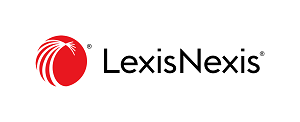
Report details trust in generative AI is dependent on accuracy of output and transparency, with 86% saying establishing ethical guidelines and standards is crucial
NEW YORK — March 13, 2024 — LexisNexis® Legal & Professional, a leading global provider of information and analytics, today released results from its inaugural LexisNexis Future of Work Report, which demonstrated a significant positive stance in trust and attitudes toward generative AI (GenAI). The survey of more than 500 professionals across diverse industries worldwide revealed that 72% of professionals anticipate a positive impact from GenAI on daily work. In contrast, 82% expect it to take over a range of repetitive administrative tasks, allowing organizations to increase productivity and accelerate growth.
The report most notably showed that despite looming concerns over job security and satisfaction, only 4% see GenAI as a threat to job security, while nearly half (45%) noted job satisfaction had improved thanks to GenAI. The positive perspective extended to the impact professionals see for overall organizational performance, with 74% expressing some degree of optimism.
“The recent and rapid rise of GenAI marks a pivotal shift in how organizations must operate and strategize. LexisNexis embarked on this survey to shed light on how GenAI technology intersects with the realities of our professional lives and can improve how we perform our work,” said Todd Larsen, President, Nexis Solutions, a division of LexisNexis. “We believe that through collaboration and a shared understanding of GenAI, organizations can adopt and embrace the massive opportunities it provides which is why this is exactly what we are focused on at LexisNexis.”
Additional insights and findings show:
- GenAI’s Value and Industry Potential: GenAI is seen as adding value across a myriad of industries, including risk and legal, marketing and sales, corporate IT, strategy and finance and more. Industries poised to benefit most from GenAI include consultancies, legal services, financial services, and media and entertainment, among others.
- Seismic Shift in Acceptance and Use of GenAI: Ninety-six percent of business professionals say technology is crucial to organizational success. Additionally, 92% of professionals are curious about GenAI’s creative potential, with 86% noting a willingness to embrace GenAI for both creative and professional work. GenAI is also viewed as a useful tool and operational game-changer, with 69% of respondents using GenAI to assist with daily tasks.
Trust in GenAI Dependent on Accuracy of Output and Transparency
While organizations are bullish on AI, they must address apprehensions and build guardrails to counter mistrust with GenAI. Concerns range from data privacy issues to ethical questions about algorithmic bias and decision-making transparency. Nearly nine in ten professionals rank the quality and accuracy of the output as the #1 consideration in selecting a GenAI tool, and 86% say establishing ethical guidelines and standards is crucial. When it comes to building trust, a resounding majority (97%) say that human validation of GenAI outputs is important, and 80% report that ensuring systems are transparent and explainable is necessary.
To access LexisNexis’ entire Future of Work report and more details, please visit https://professional.lexisnexis.com/en-us/future-of-work-2024. For more information on leading legal AI tools from LexisNexis, also visit www.lexisnexis.com/genai.
About LexisNexis Legal & Professional
LexisNexis® Legal & Professional provides legal, regulatory, and business information and analytics that help customers increase their productivity, improve decision-making, achieve better outcomes, and advance the rule of law around the world. As a digital pioneer, the company was the first to bring legal and business information online with its Lexis® and Nexis® services. LexisNexis Legal & Professional, which serves customers in more than 150 countries with 11,800 employees worldwide, is part of RELX, a global provider of information-based analytics and decision tools for professional and business customers.
Contact Information
Name: Leela Bozonelis
Email: leela.bozonelis@lexisnexis.com
Job Title: Global Product Marketing Director
